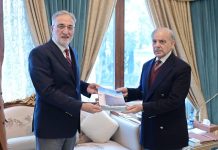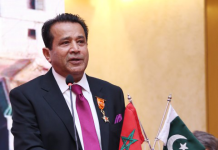
ISLAMABAD: Following the International Monetary Fund (IMF) Executive Board’s approval for a $7 billion Extended Fund Facility (EFF), Finance Minister Muhammad Aurangzeb said the government plans to impose strict restrictions on non-filers which will “further limit their ability to conduct various activities.” A day earlier, the Washington-based lender sealed the deal with Islamabad, approving Pakistan’s loan with its first tranche of $1.1 billion likely to be released by September 30, 2024. The interest rate on the loan is less than 5%, sources in the Ministry of Finance said, adding the IMF may disburse the second instalment within this fiscal year. The cash-strapped country had to undertake a slew of measures demanded by the IMF, including broadening the tax next, enforcing tax on agricultural income, and increasing the electricity and natural gas prices. In an interview with Voice of America today, the FinMin emphasised that fundamental economic reforms were needed to make the existing IMF programme “the last one for the country”. “Transformation of the economy into an export-driven one necessitates structural reforms, only then could the country move forward in the next three years.” Aurangzeb said, the friendly countries have assured financial support to meet the financial needs through the new Fund programme. “We had no choice but to implement economic reforms, which included bringing sectors currently outside the tax net into the fold,” he noted. However, the minister said, the burden on salaried and manufacturing classes would be reduced and highlighted the need to bring into tax net the retailers, wholesalers, agriculture, and property sectors. He said that despite a 29% increase in revenues last year, the tax-to-GDP ratio remained at 9%, which is insufficient to stabilise any country’s economy.In line with the conditions of IMF — which had repeatedly demanded improved tax collection, the federal government presented the tax-loaded Rs18.877 trillion budget for the fiscal year 2024-25 (FY25) in June. The budget aimed at raising Rs13 trillion by next July, a roughly 40% increase from the current financial year, to bring down a ruinous debt burden that has caused 57% of government revenue to be swallowed by interest payments. In response to a question, Aurangzeb mentioned that the government was abolishing the term “non-filer” and will impose restrictions on tax evaders, limiting their ability to conduct various activities. On Tuesday, the Federal Board of Revenue (FBR) announced a series of restrictions targeting non-filers to enhance tax compliance and broaden the tax base by abolishing the non-filer category, The initial restrictions include purchasing property, buying cars, investing in mutual funds, opening current accounts and engaging in international travel, except those for religious purposes. Elimination of the non-filer category means that individuals who previously paid a small fee to avoid taxes on these transactions will no longer be able to evade tax obligations. In today’s interview, the finance minister also noted that the government possesses data on individuals’ lifestyles, including the number of vehicles owned, international travel, and other expenditures. This information will enable the FBR to bring tax evaders into the tax net without arrest, he added. He pointed out that Pakistan’s undocumented economy has been valued at Rs.9 trillion, which needed to be documented. “Prime Minister Shehbaz Sharif believed that business should be handled by the private sector and not by the government. To achieve this, the cabinet’s privatisation committee has advanced the privatisation process of government institutions to its final stages”, he added. On Thursday (today), Prime Minister Shehbaz Sharif held a meeting with Managing Director of the International Monetary Fund (IMF) Kristalina Georgieva on the sidelines of the UNGA in New York. Appreciating the collaboration with IMF for a successful Staff Level Agreement (SLA) for a 37-month, $7 billion Extended Fund Facility (EFF) for Pakistan, the prime minister highlighted the government’s commitment to implementing structural reforms and promoting private sector development.





















